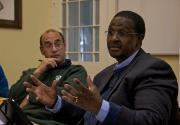
“The Black Consciousness Movement in South Africa,” drew on Prof Barney Pityana’s own experiences as one of the founders of the movement, and particularly, the culture of education and activism that he and his contemporaries were so committed to.
Prof Pityana described his “great appreciation for what universities can do in creating a culture of activism amongst people.” Comparing student culture today to the days when the movement was most vigorous, he described the reproachful way the ANC has treated youth in recent years, underestimating their social capital and ability to lead.
“What kind of youth and students are you creating,” he asked the audience, many of whom were educators, later suggesting there should be more scholarship around the way society is shaped by student activism.
The starting point,” he said, “is [asking] where are young people and what’s happening on campuses.” He went on to say how most activism happens though political parties, criticising how political affiliation impedes one’s ability to challenge the status quo and drive significant change. Pityana seemed to suggest that student movements can either be a powerful independent force for social change, or a function of the state.
Describing the crisis higher education faces in offering students an ontological frame, he spoke about “[students] who never know who they are.” Many graduate university, frustrated and with no better idea of the values that will inform the rest of their lives. Often these graduates choose to go overseas and “opt out” of the challenges and opportunities that face them in a developing space.
“Youth and students have a legitimate interest in the way society is ordered,” said Prof Pityana. If students become more robustly involved in the shaping of societal values, there’s higher likelihood they’ll invest in and commit themselves to its improvement in the future. He questioned the narrow ideals society imposes upon universities and places of higher education as simply, sites for leveraging an individual future.
Drawing out more about Prof Pityana’s role in the Black Consciousness Movement, discussant, Professor Robbie van Niekerk spoke about how the movement fostered a thinking environment. Education acted as an “emancipatory [value]” that first lifted individuals to realise their potential and worth so they could then effect societal change.
Prof Pityana said that every generation has to accept its own role in time, and the fact that many youths remain on the fringes is an unacceptable reality. Society needs to recognise the mine of potential in its students and develop it further, but this no doubt, will require a reshaping of social values. “What are the anchors for the development of consciousness for young radicalism and consciousness today,” he asked.
Photo and story by Hailey Gaunt
